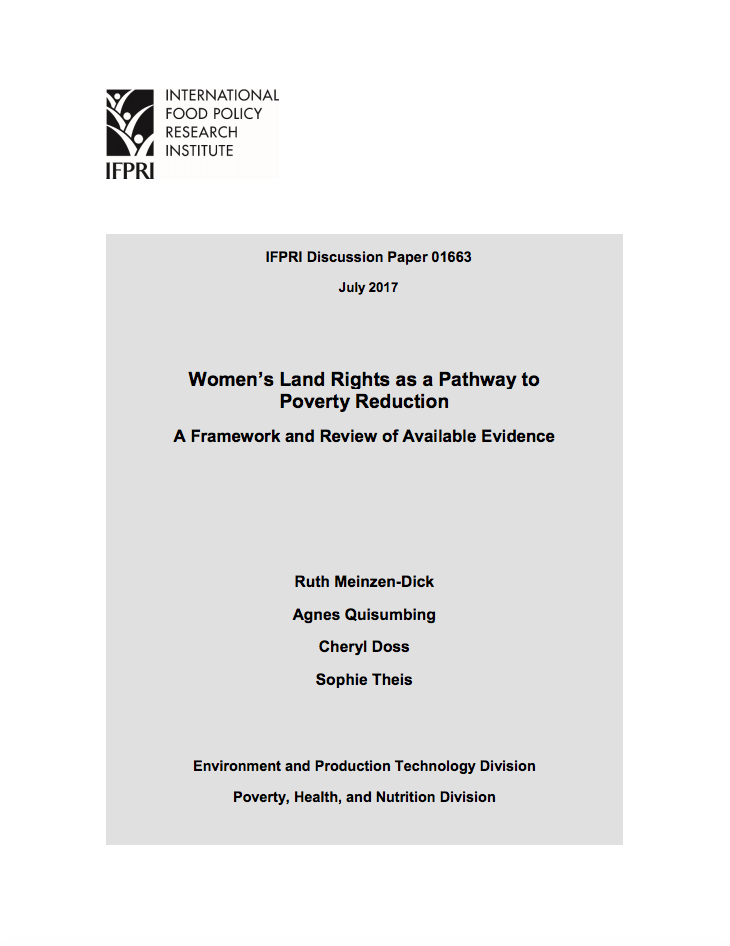Focal point
Location
About IFPRI
The International Food Policy Research Institute (IFPRI) provides research-based policy solutions to sustainably reduce poverty and end hunger and malnutrition in developing countries. Established in 1975, IFPRI currently has more than 500 employees working in over 50 countries. It is a research center of theCGIAR Consortium, a worldwide partnership engaged in agricultural research for development.
Vision and Mission
IFPRI’s vision is a world free of hunger and malnutrition. Its mission is to provide research-based policy solutions that sustainably reduce poverty and end hunger and malnutrition.
What We Do
Research at IFPRI focuses on six strategic areas:
- Ensuring Sustainable Food Production: IFPRI’s research analyzes options for policies, institutions, innovations, and technologies that can advance sustainable food production in a context of resource scarcity, threats to biodiversity, and climate change. READ MORE
- Promoting Healthy Food Systems: IFPRI examines how to improve diet quality and nutrition for the poor, focusing particularly on women and children, and works to create synergies among the three vital components of the food system: agriculture, health, and nutrition. READ MORE
- Improving Markets and Trade: IFPRI’s research focuses on strengthening markets and correcting market failures to enhance the benefits from market participation for small-scale farmers. READ MORE
- Transforming Agriculture: The aim of IFPRI’s research in this area is to improve development strategies to ensure broad-based rural growth and to accelerate the transformation from low-income, rural, agriculture-based economies to high-income, more urbanized, and industrial service-based ones. READ MORE
- Building Resilience: IFPRI’s research explores the causes and impacts of environmental, political, and economic shocks that can affect food security, nutrition, health, and well-being and evaluates interventions designed to enhance resilience at various levels. READ MORE
- Strengthening Institutions and Governance: IFPRI’s research on institutions centers on collective action in management of natural resources and farmer organizations. Its governance-focused research examines the political economy of agricultural policymaking, the degree of state capacity and political will required for achieving economic transformation, and the impacts of different governance arrangements.
Research on gender cuts across all six areas, because understanding the relationships between women and men can illuminate the pathway to sustainable and inclusive economic development.
IFPRI also leads two CGIAR Research Programs (CRPs): Policies, Institutions, and Markets (PIM) andAgriculture for Nutrition and Health (A4NH).
Beyond research, IFPRI’s work includes partnerships, communications, and capacity strengthening. The Institute collaborates with development implementers, public institutions, the private sector, farmers’ organizations, and other partners around the world.
Resources
Displaying 71 - 75 of 1521Animal sourced foods and child stunting
Stunting affects 160 million pre-school children around the world, and imposes significant costs on a child’s health, cognitive development, schooling and economic performance. Stunting in early childhood has been linked to poor dietary diversity, notably low intake of animal-sourced foods (ASFs) rich in high quality protein and other growth-stimulating nutrients. Surprisingly, however, very little economic research has focused on ASFs and child growth. In this paper we redress this omission through an analysis of 112,553 children aged 6-23 months from 46 countries.
Implications of wide-scale cropland restoration: A crucial element of the forest landscape restoration approach
The results of this study reveal that the full inclusion of crop production in the forest landscape restoration approach could produce largescale,
worldwide benefits for food security and therefore facilitate a wide uptake of restoration practices and the implementation of large
restoration projects. The positive impacts are multifaceted and significant in size: a reduction in malnourished children ranging from three
to six million; a reduced number of people at risk of hunger, estimated to be between 70 and 151 million; reduced pressure for expansion
Seeing is believing? Evidence from an extension network experiment
Women’s land rights as a pathway to poverty reduction
Land is an important asset for rural households, and having secure land rights is important for poverty reduction. Despite the large body of literature on the relationship between land tenure security, livelihoods, and poverty, most of this literature is based on household-level data and does not consider possible intrahousehold inequalities in land ownership.







